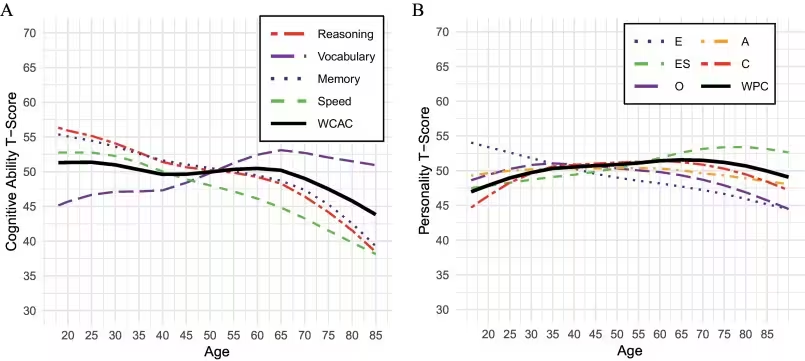5 Minutes
Many people assume mental sharpness declines steadily after youth, but recent research paints a more nuanced picture: overall psychological functioning often reaches its high point in the late 50s. That finding reframes midlife not as a countdown but as a period when certain strengths—judgement, emotional balance and practical knowledge—come together to support smarter decisions and leadership.
How researchers mapped mental strengths across a lifetime
To understand how different mental faculties change with age, scientists compiled large-scale studies that measured long-standing psychological traits rather than short-term moods. They selected 16 well-validated dimensions that reliably predict real-world performance: core cognitive skills (reasoning, memory span, processing speed, domain knowledge), emotional intelligence, and the five major personality traits (extraversion, emotional stability, conscientiousness, openness, and agreeableness), among others.

Method and scale
Rather than relying on a single test, researchers standardized results from multiple cohorts and datasets to a common scale. This let them plot each trait’s trajectory across adulthood and then combine the measures into a weighted index representing broad psychological functioning. The synthesis focused on enduring characteristics (traits) and used established statistical methods to reduce bias and improve comparability.
What peaks later—and why that matters
The analysis revealed a striking pattern: while raw processing speed and some memory functions start to decline from the mid-twenties, other capacities continue to strengthen for decades.
- Conscientiousness, linked to reliability and planning, tended to peak near age 65.
- Emotional stability (low neuroticism) reached higher levels around age 75 for many adults.
- Complex moral reasoning and the ability to resist cognitive biases improved into older adulthood for some people, sometimes well into the 70s and 80s.
When the trajectories for all 16 dimensions were aggregated into a single, theory-informed index, overall psychological functioning most often peaked between ages 55 and 60. That peak usually gave way to gradual decline starting around 65 and became more pronounced after about 75.
Why does this matter? In professional and civic life, success depends on more than raw processing speed. Leadership, strategic problem solving and high-stakes decision-making draw heavily on judgement, accumulated knowledge, emotional regulation and conscientiousness—traits that often strengthen into midlife and beyond. This combination helps explain why many demanding leadership roles are often filled by people in their 50s and early 60s.
A closer look at workplace and policy implications
The findings challenge age-based assumptions that equate older age with reduced competence. Employers and institutions frequently make hiring or retention decisions using rigid age expectations—mandatory retirement rules for pilots and air traffic controllers, for example, or informal biases that treat older applicants as short-term investments. While some safety-critical roles legitimately require strict cognitive standards and upper age limits, a blanket approach risks overlooking experienced candidates whose combined strengths make them especially effective.
Importantly, individual variation is large. Some people maintain processing speed and memory well into later life; others show earlier declines. That variability suggests assessments should emphasize actual ability and trait profiles rather than chronological age alone. Policies that promote age-inclusive hiring and targeted retraining could better match people to roles where their midlife strengths—judgement, resilience, and domain expertise—are most valuable.
Scientific context: what neuroscience and aging research say
Neuroscience helps explain part of this pattern. Neuroplasticity— the brain’s ability to reorganize with experience—persists across adulthood, and accumulated knowledge (sometimes called crystallized intelligence) tends to grow with experience even as fluid processing speed diminishes. Emotional regulation networks in the brain also adapt with age, often improving the capacity to manage stress and weigh long-term consequences. Together, these mechanisms support the observed midlife peak in composite psychological functioning.
Expert Insight
“What we see is not a single curve of decline but a mosaic of strengths that shift across the lifespan,” says Dr. Maya Reynolds, cognitive neuroscientist at the Institute for Brain Research. “Processing speed and some memory tasks may slow, but improved emotional regulation, richer knowledge stores, and greater conscientiousness often produce better overall judgement in midlife. That makes people in their fifties especially well-suited for complex problem-solving and leadership roles.”
Dr. Reynolds adds that targeted cognitive training, continued professional engagement and healthy lifestyle factors—sleep, exercise, cardiovascular care—can help preserve key cognitive capacities into later years.
Practical takeaways for individuals and organizations
- Recognize midlife strengths: experience, emotional control and reliability often peak in the 50s and early 60s.
- Assess ability, not age: use objective measures and tailored assessments to match people to roles.
- Support lifelong learning: opportunities for retraining and cognitive engagement help maintain performance.
- Design age-aware policies: balance job safety requirements with flexibility that values experience-driven strengths.
The evidence reframes midlife as a period of consolidated competence rather than inevitable decline. By combining neuroscience insights with fair employment practices, societies can better harness the unique cognitive and emotional resources that often peak in our fifties.
Source: sciencealert
Comments
pumpzone
Interesting but is the sample biased? Saying peak at 55-60 feels sweeping given huge individual differences. also, how were traits weighted, and what about cultural variation?
labcore
Wow, didn't expect midlife to be a peak for overall smarts... I always pictured decline after 30. Kinda hopeful, makes me rethink career timing, need to read the studies tho


Leave a Comment